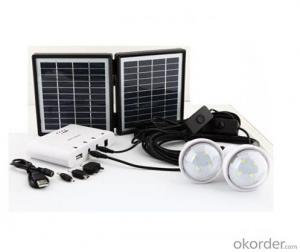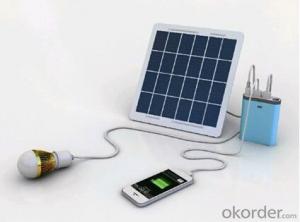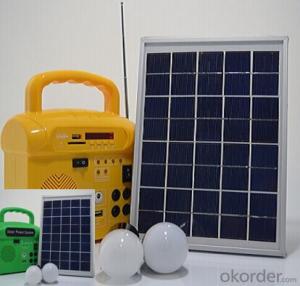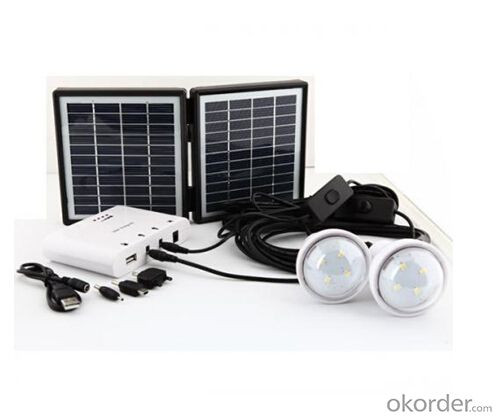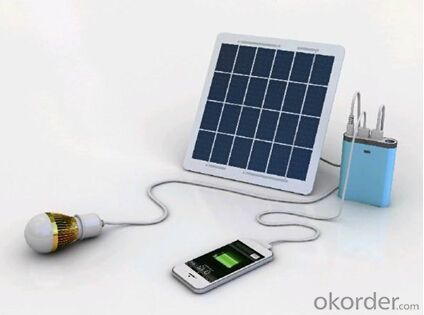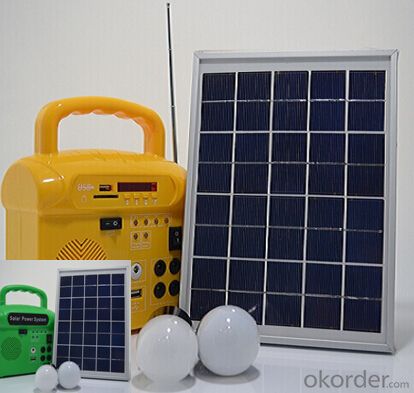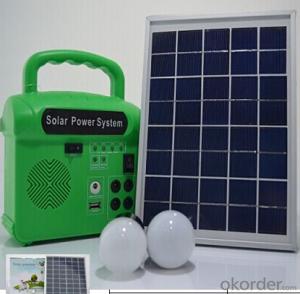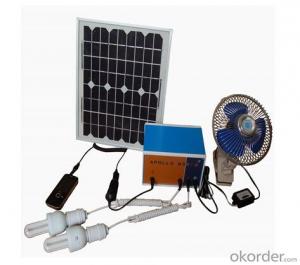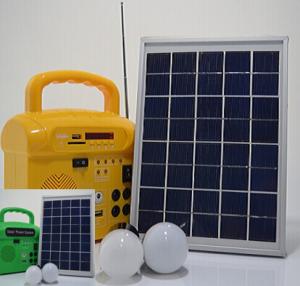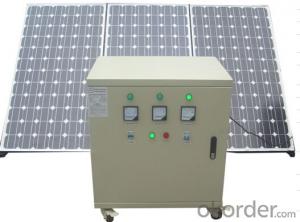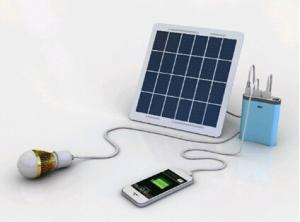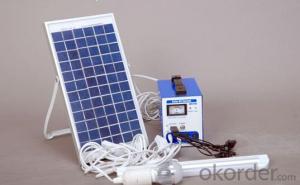Passive Solar Energy Systems CNBM Solar Home System Roof System Capacity-10w
- Loading Port:
- Shanghai
- Payment Terms:
- TT or LC
- Min Order Qty:
- 5 unit
- Supply Capability:
- 30000 unit/month
OKorder Service Pledge
OKorder Financial Service
You Might Also Like
Introduction of Solar Home System
Solar Home System is composed by Solar Panels, Inverters, Charger Controller, Battery, Cable, Mounting Bracket, which is applied to produce electricity for home use.
Solar Home System is quite suitable product in urban area and the place which is short of electricity. Our Small Solar Home System own great benifits compare with other kind electricity resources:
Electricity generating cost of Solar Home System is much cheaper than diesel engine. Beside low electricity making cost, solar system products also have the features of noiseless, clean energy, environmentally friendly and can access to many different electric appliance.
Our company’s main target is to make every family can use cheap solar energy and enjoy the new innovation of modern science and technology.
Working Principle of Solar Home System
The stand alone Solar Home System is an off-grid solar system which uses batteries to store the solar energy. Stand alone solar system solutions design for those who are not able or willing to connect to electricity grid.
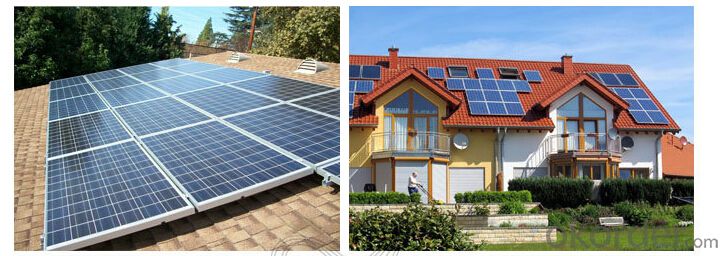


Specification of Solar Home System
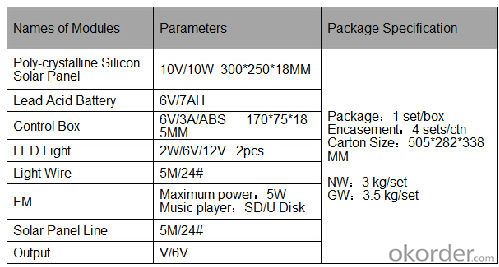
Terms and Conditions
1. Trade terms: FOB Shanghai
2. Payment terms: 30% T/T, balanced before shipment/ LC at sight before shipment. Actual Terms can be negotiated for big order.
3. Package: Exported standard package suitable for tough handling and sea transport.
4. Delivery: Goods to be ready within 10~30 days depending on order quantity.
5. Warranty: 10 years for solar panel, 2 years for controller/inverter/battery.
FAQ
Q: Could you introduce the background of your company?
A: We are a Group corp. with 1GW capacity in China, which is Okorder’s registered VIP Supplier, possess Financial Service from Okorder.com.
Q: Required mainly certificates (CE&IEC/TUV/RoHS)?
A: Our products are certificated by CE RoHS, IEC, ISO, TUV, UL etc.
Q: Your main exported market is?
A: Main markets of our products is: South-east Asia, Mid-east, Arica, East Europe and Latin America.
- Q: How does the efficiency of solar panels vary based on the temperature?
- Solar panels' efficiency is subject to variation depending on temperature. In general, solar panels perform better in cooler temperatures, but their efficiency declines as the temperature rises. This phenomenon is attributed to the materials used in solar panels, particularly semiconductor materials like silicon. As the temperature increases, the electrons in the semiconductor material gain more energy, resulting in a rise in the voltage output of the solar panel. However, this increase in voltage does not proportionally enhance the power output, leading to an overall decrease in efficiency. Furthermore, elevated temperatures can amplify the resistance of the electrical conductors within the solar panel, causing power losses and reduced efficiency. This is known as thermal losses. The heightened resistance impedes the flow of electric current, thereby diminishing the overall power output. In addition, high temperatures can trigger the "thermal runaway effect," a phenomenon where the efficiency of the solar panel rapidly declines as the temperature increases. This can pose significant challenges, particularly in regions with hot climates or during heatwaves. To counteract the adverse impact of temperature on solar panel efficiency, advanced solar panel designs incorporate cooling mechanisms. For instance, some panels are equipped with built-in ventilation systems or are elevated to facilitate air circulation underneath, ensuring dissipation of excess heat and maintenance of optimal operating temperatures. To sum up, solar panel efficiency is influenced by temperature fluctuations. While they perform better in cooler temperatures, their efficiency diminishes as the temperature rises due to increased resistance, thermal losses, and the thermal runaway effect. It is crucial to consider these factors during the design and installation of solar panels to maximize their performance and output.
- Q: What is the impact of shading on solar energy systems?
- Shading has a significant impact on solar energy systems as it can reduce the overall efficiency and output of the system. When a solar panel or array is shaded, it blocks the sunlight from reaching the photovoltaic cells, resulting in a decrease in electrical generation. Even partial shading, such as from trees or nearby buildings, can have a noticeable effect on the system's performance. It is important to design and install solar energy systems in areas with minimal shading to maximize their energy production potential.
- Q: Are there any limitations to the amount of electricity a solar energy system can generate?
- Yes, there are limitations to the amount of electricity a solar energy system can generate. The primary limitation is the availability of sunlight. Solar panels require direct sunlight to generate electricity, so factors such as weather conditions, geographical location, and time of day can affect the amount of sunlight received. Cloudy or rainy days can significantly reduce the electricity output of a solar energy system. Another limitation is the physical space available for installing solar panels. The size and number of panels that can be installed depend on the available roof or ground space. Limited space can restrict the overall capacity of the system and, consequently, the amount of electricity it can generate. Additionally, the efficiency of solar panels is a determining factor. The efficiency of converting sunlight into electricity varies depending on the type and quality of solar panels used. Higher efficiency panels can generate more electricity than lower efficiency ones. Furthermore, solar energy systems are also subject to degradation over time. Solar panels experience a gradual decrease in efficiency as they age due to factors like exposure to sunlight, temperature fluctuations, and environmental conditions. This degradation can reduce the overall electricity generation capacity of the system. Finally, energy storage is a limitation. Solar energy systems generate electricity during the day, but the demand for electricity often remains constant throughout the day and night. Without an efficient energy storage system, excess electricity generated during the day is wasted if not used immediately. Therefore, the inability to store excess electricity limits the overall amount that can be generated by a solar energy system. In summary, while solar energy systems offer a sustainable and renewable source of electricity, there are limitations to the amount they can generate due to factors such as sunlight availability, physical space, panel efficiency, system degradation, and energy storage capabilities.
- Q: Can solar energy systems be used for powering electric train systems?
- Yes, solar energy systems can be used to power electric train systems. Solar panels can be installed along the train tracks or on the rooftops of train stations to harness sunlight and convert it into electricity. This clean and renewable energy source can be utilized to charge the train's batteries or directly power the electric motors, reducing the reliance on fossil fuels and reducing carbon emissions.
- Q: How does the angle and orientation of solar panels affect energy production?
- The angle and orientation of solar panels play a significant role in determining the efficiency and energy production of a solar system. The angle of the panels, also known as the tilt angle, refers to the angle at which the panels are tilted relative to the horizontal plane. The orientation refers to the direction the panels face, typically either towards the sun or towards a fixed direction such as south. Firstly, the angle of the solar panels affects the amount of sunlight that hits the surface of the panels. The optimal tilt angle varies depending on the latitude of the location. In general, a tilt angle equal to the latitude of the area is considered ideal for maximizing energy production. This tilt angle allows the panels to receive the most direct sunlight throughout the year, as it accounts for the seasonal changes in the sun's position. If the panels are tilted at an angle that deviates significantly from the optimal tilt angle, they may not receive as much sunlight, resulting in reduced energy production. Secondly, the orientation of the solar panels is crucial for maximizing energy production. The panels should ideally face the direction that receives the most sunlight throughout the day. In the northern hemisphere, this is typically south-facing, while in the southern hemisphere, it is north-facing. This direction allows the panels to capture the maximum amount of sunlight as the sun moves across the sky. If the panels are facing a different direction, such as east or west, they will receive sunlight for a shorter period during the day, leading to reduced energy production. Furthermore, the angle and orientation of solar panels affect the incidence angle of sunlight. The incidence angle is the angle at which sunlight strikes the surface of the solar panels. Ideally, sunlight should hit the panels perpendicularly, as this maximizes the amount of energy that can be absorbed. When the incidence angle deviates from 90 degrees, the sunlight is spread over a larger area, reducing the efficiency of energy conversion. By optimizing the tilt angle and orientation, solar panels can be positioned to minimize the incidence angle and maximize energy production. In conclusion, the angle and orientation of solar panels are crucial factors in determining energy production. By tilting the panels at the optimal angle and orienting them towards the direction that receives the most sunlight, solar systems can maximize energy capture and conversion. This ensures that solar panels are operating at their highest efficiency and producing the maximum amount of energy possible.
- Q: Can solar energy systems be used for heating and cooling homes?
- Solar energy systems have the potential to be utilized for both heating and cooling homes. The energy from the sun can be captured by solar panels or solar water heaters to generate electricity or heat, which can then be used to power heating and cooling systems within homes. For heating purposes, there are various methods in which solar energy can be employed. Solar thermal systems can be installed to warm water for radiant floor heating or produce steam for heating purposes. Solar air heating systems are another option, as they can warm the air that can be distributed throughout the house using ductwork and fans. Additionally, solar heat pumps can be utilized to transfer heat from the sun into the home. In a similar vein, solar energy can also be effectively utilized for cooling homes. Solar-powered air conditioning systems can be employed, utilizing solar energy to operate the compressors and fans necessary for cooling. These systems are particularly advantageous in regions with hot climates, where sunlight availability aligns with the need for cooling. The use of solar energy systems for both heating and cooling offers numerous benefits. First and foremost, solar energy is a clean and renewable source of energy, which reduces reliance on fossil fuels and minimizes carbon emissions. Furthermore, the use of solar energy systems provides long-term cost savings, as they decrease or eliminate the need for traditional heating and cooling methods that rely on grid electricity or fossil fuels. Additionally, solar energy systems can be easily integrated into existing homes or included in new construction projects, making them a versatile and sustainable option for heating and cooling residential properties.
- Q: Are there any disadvantages of using solar energy?
- Yes, there are a few disadvantages of using solar energy. Firstly, the initial installation cost of solar panels can be quite expensive. Additionally, solar panels can take up a significant amount of space, especially when considering large-scale installations. Furthermore, solar energy generation is dependent on sunlight availability, meaning it may not be as reliable during cloudy days or at night. Finally, the production and disposal of solar panels can have environmental impacts, as they involve the use of certain chemicals and materials.
- Q: Can solar energy systems be used for powering electric vehicle solar charging garages?
- Yes, solar energy systems can be used to power electric vehicle solar charging garages. Solar panels can be installed on the roofs or surrounding areas of the garages to generate electricity from sunlight. This renewable energy can then be utilized to charge electric vehicles, reducing the dependence on fossil fuels and decreasing carbon emissions.
- Q: Can solar energy systems be used in areas with limited access to transportation?
- Yes, solar energy systems can be used in areas with limited access to transportation. Solar panels can be transported to these areas using alternative methods such as by foot, bicycle, or even by using local transportation options like boats or animal-drawn carts. Additionally, once installed, solar energy systems require minimal maintenance and can provide clean and reliable electricity without the need for ongoing transportation of fuel or resources.
- Q: Can a solar energy system be installed on a parking garage or structure?
- Certainly, it is entirely possible to install a solar energy system on a parking garage or structure. As a matter of fact, these locations are often considered ideal for solar installations due to their expansive surface areas and access to sunlight. The utilization of available space can be maximized by mounting solar panels on the roof or external walls of parking structures. Furthermore, the raised position of parking garages enables better exposure to sunlight, resulting in more efficient generation of solar energy. Furthermore, the installation of a solar energy system on a parking garage or structure can yield numerous advantages, including the generation of clean and renewable energy, reduction in electricity costs, and offsetting of carbon emissions. This choice therefore proves to be a sustainable and environmentally friendly option for energy production.
Send your message to us
Passive Solar Energy Systems CNBM Solar Home System Roof System Capacity-10w
- Loading Port:
- Shanghai
- Payment Terms:
- TT or LC
- Min Order Qty:
- 5 unit
- Supply Capability:
- 30000 unit/month
OKorder Service Pledge
OKorder Financial Service
Similar products
Hot products
Hot Searches
Related keywords
